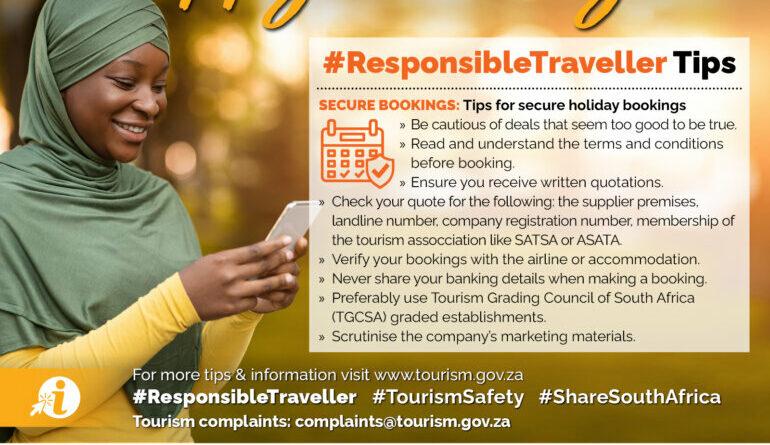Safety advice when booking that travel destination
South Africa is a destination of choice for tourists due to its scenic beauty, sunny climate, majestic mountains, warm beaches, unrivalled wildlife, efficient business conferences, eco and sport adventure. We are renowned for our cultural diversity, warm hospitality and friendly people.
To make your holiday extra enjoyable, the Department of Tourism is providing tips to ensure that your bookings are safe and hassle-free.
The following are areas that tourists to and from South Africa should be aware of:
1. When booking a holiday or pilgrimage, ensure you use legitimate service providers. To minimise the risk of fraud, look for the following indicators, keeping in mind that not all may apply to every travel agent or tour operator:
• Be cautious of deals that seem too good to be true. If prices are significantly lower than elsewhere, it’s likely a scam.
• Check if the travel provider is a member of the Association of Southern African Travel Agents (ASATA) or a recognised travel agency brand. Professional bodies ensure their members are legitimate and protect customers’ interests. Preferably membership of a tourism association, which should also be cited on the quotation along with the Registration number of the company.
• Pay for your bookings using a credit card instead of EFT. Credit card purchases offer protection and a better chance of recovering funds if fraud occurs.
• Scrutinise the company’s marketing materials and website. Fuzzy logos, lowresolution images, and unprofessional designs are red flags.
• Be wary of high-pressure sales tactics urging you to make immediate payments or deposits to secure limited spots.
• Double-check the legitimacy of deals for high-profile events like sports tournaments or religious pilgrimages, as these are prime targets for scammers.
• If you receive unsolicited emails from “reputable” travel companies requesting personal details, do not respond. Legitimate businesses will not ask for sensitive information via email.
• When booking holiday accommodations, verify the property’s existence and ownership through reliable sources before making any payments.
• If you suspect you’ve fallen victim to a travel scam, contact your bank’s fraud department immediately and report the case to the police.
• Premises of the travel supplier (travel agent or tour operator), and a landline number.
• A functioning and updated website – check that the links are working and contact details are included.
• Ask others who have used the agent for their opinion.
• Ensure you receive written, not telephonic, quotations.
• Carefully read and understand the terms and conditions before proceeding with the booking.
• Once your bookings are made, you can also pro-actively check with the airline or accommodation to confirm that your booking has been made.
• Avoid sharing your banking details when making a booking.
• If the establishment claims to be graded, you can check this at the following link: https://www.tourismgrading.co.za/find-a-graded-establishment/search-forgraded-accommodation.
• When making reservations, if possible, check whether your service provider has protection mechanism which assures protection of your pre-deposits or ask the question whether the agent is bonded.
2. Be wary of any of the following:
• Offers that insist on immediate payment for any reason including a common pressure that today is the last day of the offer and it will never be repeated.
• One famous trick that scammers use is that you receive an e-mail saying the establishment is overbooked and we would like to refund you, please submit your banking details. It is better to call the establishment and check.
• Be aware of communication saying you have won a vacation, without you having entered a competition. Often, these offers entice customers to sign a contract which contain hidden clauses.
Health Precautions and Safe Travel – Be thoughtful, defensive and considerate to prevent the need for further medical intervention https://t.co/k9s9odoKhY #ArriveAlive #TravelSafety pic.twitter.com/5xvBYYsZvR
– Arrive Alive (@_ArriveAlive) November 28, 2022




